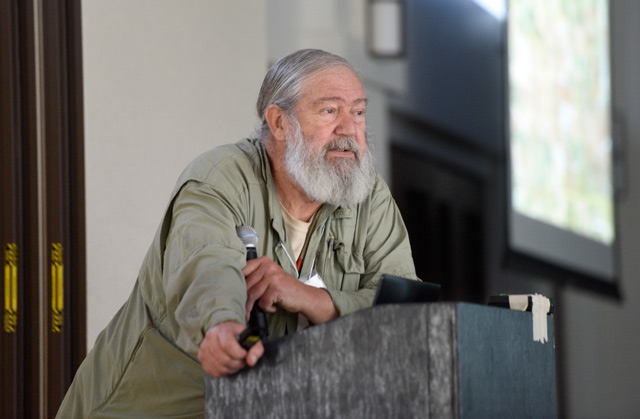Endangered Species in the Line of Fire?
Biologists Fret Over Fate of Condors, Island Foxes, Steelhead Trout

Some of the rarest plants and animals on the planet live along the Santa Barbara mainland, its offshore islands, and the ocean realms in between. And some of the brightest scientific minds have dedicated their life’s work to studying these endangered species, from the back-from-the-brink success stories of the California condor and the Santa Cruz Island fox to the always contentious steelhead trout.
While plenty of head-scratching has long been associated with the imminent demise or promising rebound of any federally listed life-form, the past few months — since the election of Donald Trump — have produced particularly vigorous bouts of uncertainty and concern.
“There has been a lot of talk about this in the environmental community,” said Maggie Hall with Santa Barbara’s Environmental Defense Center. “There are potentially big-picture threats to the Endangered Species Act (ESA) at several levels.”
Hall broke it down, focusing on the three branches of the federal government. First, legislatively, a Republican-controlled Congress could aim to weaken the ESA without fear of a presidential veto.
Second, at the judicial level, Trump’s appointment of one or more justices to the Supreme Court could shift the balance of power toward more conservative opinions. In that respect, Trump has said he admires late Justice Antonin Scalia, whose seat on the highest court has been vacant since February of last year, when he died at the age of 79. The president-elect has said he would pick a replacement with legal views similar to those embodied by Scalia, who once described the Endangered Species Act as unfair “to the point of financial ruin — not just upon the rich, but upon the simplest farmer who finds his land conscripted to national zoological use.”
Last, from the executive branch, a Trump administration could focus on two approaches to jeopardize species protected by the ESA. The first is to simply cut funding to agencies working closely on endangered species recovery, particularly when those efforts are then viewed as restricting the sort of economic growth and homeland energy production on which Trump based much of his campaign.
“Agency funding is always an issue,” Hall said, adding that many of the biologists and ecologists heading up recovery efforts for endangered species are already stretched thin. The other executive privilege — which ramped up considerably over the past few weeks, heading into the president-elect’s first day on the job — rests with Trump’s cabinet picks and the bureaucratic underlings who carry forth his administrative vision, a perspective of political landscape and governmental role that’s very different from the last eight years through Obama’s prism.
None of this is new territory for endangered species and their protections, reminded Hall. “We’ve always had these threats; there’s always been that tension,” she added, “but now the right wing has a lot more power.”
Reflecting on the backlash Trump has experienced thus far, longtime UCSB ecologist Sam Sweet expressed cautious optimism and a wholehearted belief in the long-view accomplishments of people “fighting the good fight,” he said. “I can’t imagine a push in Congress to repeal the ESA or water it down. My guess is that those sorts of efforts would get tied up. In a lot of cases, it’s who’s hollering the loudest, and right now, NGOs [non-governmental organizations] are going crazy with fundraising, and lots of people just don’t buy into this stuff [about the ESA being a bad thing].”
Sweet did admit that the results of November 8 have left “a lot of people really shell-shocked,” he said. “Like, ‘Oh, no! Not this again!’ We’ve all fought these battles before. The feeling is that the coming years will not be good, and it’s safe to say that there’s a great concern among my colleagues. Trouble is, we don’t know yet how great these threats could be.”



